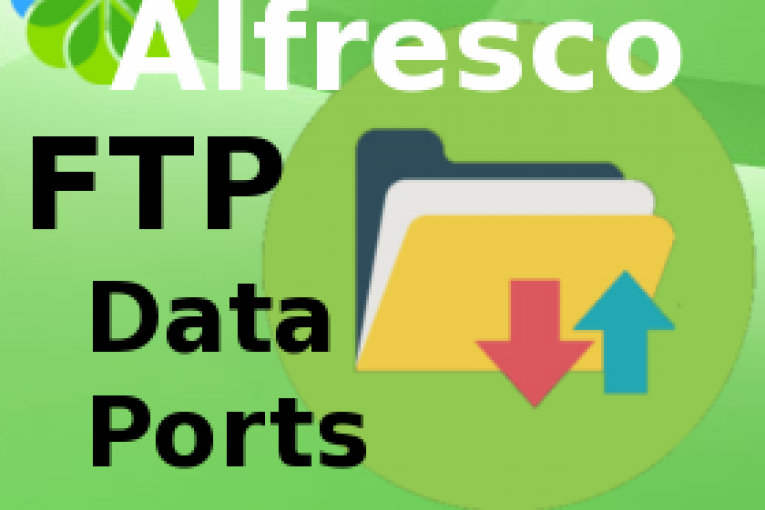
Alfresco FTP File Server allows to use a specific range of ports for passive mode connections. In this case, you will have to open these ports in your firewall. If you have a NAT router, you need to forward these ports to the local machine Alfresco is installed on. The following properties in the alfresco-global.properties file can be configured for the FTP server.
### alfresco-global.properties settings
ftp.enabled=true
ftp.port=2121
ftp.dataPortFrom=34000
ftp.dataPortTo=56000
ftp.ipv6.enabled=false
# Possible values are: STATE, RXDATA, TXDATA, DUMPDATA,
# SEARCH, INFO, FILE, FILEIO, ERROR, PKTTYPE,
# TIMING, DATAPORT, DIRECTORY, SSL
ftp.sessionDebug=
protocols.rootPath=/${spaces.company_home.childname}
filesystem.storeName=${spaces.store}
filesystem.rootPath=${protocols.rootPath}
### Open these ports in your firewall TCP 2121 TCP range 34000-56000 (SYN_SENT) TCP range 60000-60500 (PASSIVE)
 English
English Italian
Italian


FTP is very complex to set up. Binfer is a more secure alternative. Check it out
Hi Hal,
I think you’re confused about what the Alfresco and its FTP subsystem is…
Alfresco is not a file transfer or sharing services!
If you are looking for a file transfer service or an easy way to store and share photos, videos, and other types of computer file via FTP, probably Binfer (and many other services) is what you are looking for.
Again if you are frustrated for spending many hours to install and configure a pure linux-based FTP service like proftp or vsftpd, probably Binfer saves your time.
But Alfresco should not be considered a simple File Sharing Service like Dropbox, WeTransfer, GoogleDrive, Binfer and so on…
Alfresco is an Enterprise Content Management system (ECM) and it must be compared with document management platforms like Documentum, SharePoint, Nuxeo, etc.
Alfresco is not a pure FTP Server but an enterprise oriented solution for document management. It allows organizing and storing an organization’s documents, and other content, that relate to the organization’s processes. Furthermore Alfresco encompasses strategies, methods, and tools used throughout the lifecycle of the content.
Alfresco FTP is a File Server Subsystem, an intermediate layer that allows access to the Alfresco data stores through the FTP standard protocols (at low-level alfresco supports also others standard transport protocols like SMB/CIFS, NFS, Webdav ). This allows you to browse and interact directly with the Alfresco content repository through the main standard transport protocols.
If you have considered Alfresco probably you need an ECM, so:
– your data are handled by complex workflows (transform, move, copy, manipulate, etc., any data stored on Alfresco through JBPM and Activiti engines)
– your data have a lot of metadata (a ECM gives you folders, content and a few other content types, but you’ll probably want to create your own business-specific types)
– your access rights are handled in a fine grained way (creation your own permission model, permissions handled per file or per directory, quotas etc.)
– your data must be accessed in a collaborative team environment (a web based interface where people can share their work through wiki pages, forums, document library, links, calendar, etc.)
– your development team need a REST API and SOAP to create custom remote frontend
– your development team need a JCR compliant environment (and JCR over RMI)
– your teams must be quickly operational for custom developments (you develop in Agile)
– you must support CMIS (the open standard for ECM interoperability, it enables information sharing between different ECM systems)
– you need to easy integrated your content repository with the popular enterprise web platform Liferay Portal
– you have an Active Directory and you want your repository to use it (Alfresco uses the native Java LDAPFactory and it integrates perfectly with an LDAP directory whether it is AD, OpenLDAP or something else)
– you need internal schedulers allow some jobs to be executed remotely
– you need a high-available and scalable solution, Cluster must be supported for high loads
As you will figure out, the Alfresco FTP is only a minimal subsystem of a more complex and huge ECM platform.
Giuseppe